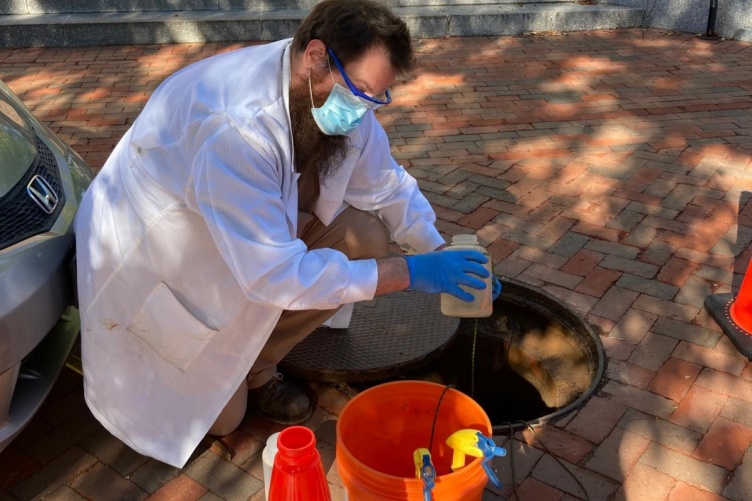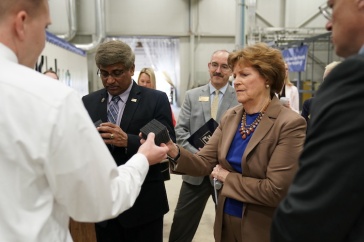
Kellen Sawyer, a research technician leading the UNH sewage monitoring, retrieves a sample from one of the manholes on campus that is accessed three mornings a week to help detect and track COVID-19. Photo by Paula Mouser.
UNH research is flushing out cases of the coronavirus by testing wastewater on campus. The sewage sampling is being used as a secondary surveillance method to the already required twice-weekly individual nasal test to track and detect SARS-CoV-2, the virus that causes COVID-19.
“Sewage sampling can be a valuable surveillance tool because it can provide an early warning to possible infection hot spots on campus and help identify areas where the virus may be present but not detected in individuals because they aren’t showing symptoms,” says Paula Mouser, associate professor of civil and environmental engineering and leader of this effort.
“Sewage sampling can be a valuable surveillance tool because it can provide an early warning to possible infection hot spots on campus.”
The wastewater testing, which is being led by a team of environmental engineers in Mouser's lab, can identify traces of the virus’s genetic material in human sewage. When individuals are infected, the virus is present in their gastrointestinal tract and released in human waste products which move into the sewer lines.
Wastewater samples, which contain urine and feces as well as traces of sewage from cooking and laundry, are retrieved from manholes around campus and tested for two biomarkers (N1 and N2) of the SARS-CoV-2 virus. Each manhole accessed represents wastewater from a grouping of two to five dorms known as a mini-sewershed. There are 10 residence hall sewersheds currently being tested, representing close to 4400 students, or approximately 80% of those living on campus. Mouser's team is also testing wastewater at the Durham wastewater treatment facility to see how the campus signal relates to the biomarker signal in the wider community.
Sewershed biomarker levels have tracked closely to known infections that occurred in several campus residence halls.
“We continue to tap the research expertise at UNH to find new and innovative ways to keep our campus community safe, and wastewater testing offers another means of tracking the spread of the virus,” says Marian McCord, senior vice provost for research, economic engagement and outreach.
Wastewater testing began when students moved back onto campus for the fall semester. The human gastrointestinal tract can shed the virus for several weeks after an individual tests negative with a nasal swab test. Even though students were required to test negative before returning to campus, initial biomarker baseline levels suggest that some students may have been unknowingly infected over the summer.
At UNH, wastewater samples are taken three mornings a week. The sample processing is done in Mouser’s lab, with biomarker quantification conducted with a digital droplet PCR instrument housed at UNH's Hubbard Center for Genome Studies.
If a spike of viral biomarkers is detected in the sewage from one of the dorm groupings, the information is compared to corresponding results from nasal swab COVID-19 tests processed at UNH’s state-of-the-art testing lab, located at UNH Health & Wellness. Students living on campus are tested for COVID-19 every four days with self-swabbing kits. The wastewater testing program can correlate any uptick of cases to prevent the spread of the virus and help students get the proper care. According to the World Health Organization, wastewater testing has a long history in virus surveillance and has been used in other outbreaks like the polio virus.
“We realized early on the importance of doing virus testing ourselves,” says Marc Sedam, vice provost for innovation and new ventures. “The wastewater testing has been a useful enhancement for environmental monitoring but not a replacement for our robust campus testing process.”
While wastewater testing started as a complementary monitoring service for the UNH testing lab, Mouser’s team has heard from a number of schools, wastewater utilities and healthcare facilities looking for guidance on creating a similar approach and technologies. Her team is working on a pilot program to help organizations apply the biomarker surveillance approach to their own wastewater samples in their communities across the state.
This wastewater surveillance testing was funded in part by UNH’s Collaborative Research Excellence initiative, which funded six UNH research projects related to COVID-19.
-
Written By:
Robbin Ray ’82 | UNH Marketing | robbin.ray@unh.edu | 603-862-4864



















































